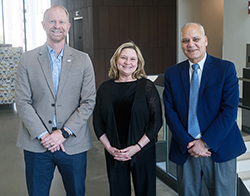
A high intensity interval training program and restricted diet can improve liver health
New research from the University of Missouri School of Medicine suggests intensive lifestyle interventions are an effective way of treating and improving liver disease.
In this MU study of 24 patients with metabolic dysfunction-associated steatohepatitis (MASH), a common liver disease caused by excessive fat buildup, one group followed a restricted diet and a high intensity interval training exercise program for 10 months. They dramatically improved their liver health over the control group of patients who received standard of care treatment.
Diet and exercise are the first lines of treatment for liver disease; however, this study is the first to examine the impact of diet and exercise on liver health and confirm the organ’s recovery through imaging and diagnostic biopsies. These techniques allow for measurements of liver inflammation, fat buildup, fibrosis development and other indicators of liver health.

“Other studies investigated the impact of either diet or exercise on the liver, not both,” said study author Elizabeth Parks, Professor of Nutrition and Exercise Physiology. “In addition, similar studies were just observational, but at Mizzou, we have technology for metabolic imaging that can give in-depth data on liver disease.”
Additionally, the collaborative nature in the MU School of Medicine helped the researchers gather more data about the participants’ overall health. Nutritionists determined the best food intake for each participant and tracked their caloric and nutrient intake, and pathologists examined blood biochemistries with each blood sample taken.
The patients treated lost about 13-22 pounds and had increased muscle mass, while the control group lost 0-9 pounds. The peak oxygen uptake, considered an indicator of cardiovascular health and the ability to exercise, was much higher on average for the treatment group compared to the control. Insulin sensitivity, which measures how effectively cells convert glucose to energy, also increased for treated patients.
Obesity is one of the most prominent risk factors in developing MASH, and other conditions like high blood pressure and type 2 diabetes can contribute. Lifestyle interventions can be used to treat these conditions and reverse liver damage. It may even protect against future development of MASH.
“Obesity and diabetes are going up in the country, and they are the two main risk factors for fatty liver disease,” Parks said. “We know diet and exercise can alleviate these health conditions. Liver disease is increasing too fast. We were able to show in our research how diet and exercise should be the mainstay of treatment for the disease.”
Though more research is needed to validate and explore these findings, this breakthrough offers some hope.
“Our findings suggest liver disease doesn’t have to be a chronic, progressive condition,” Parks said.
Elizabeth Parks, PhD is a professor of Nutrition and Exercise Physiology and works in the Department of Medicine in the Division of Gastroenterology and Hepatology at the MU School of Medicine. She has dual appointments in the College of Agriculture, Food and Natural Resources and at NextGen Precision Health.
“Histological improvements following energy restriction and exercise: The role of insulin resistance in resolution of MASH” was recently published in the Journal of Hepatology. In addition to Parks, MU study authors include graduate students Justine Mucinski, Mary Moore, and Rory Cunningham; postdoctoral fellow Amadeo Salvador; Talyia Fordham, doctoral candidate and graduate research assistant; Jennifer Anderson, senior research specialist; Grace Shryack, research associate; Guido Lastra Gonzalez, MU Health Care endocrinologist, Ayman H. Gaballah, MU Health Care radiologist; Alberto Diaz-Arias, former MU Health Care pathologist; Jamal A. Ibdah, MU Health Care gastroenterologist; and R. Scott Rector, Director of the Roy Blunt NextGen Precision Health building.

Highlighting the promise of personalized health care and the impact of large-scale interdisciplinary collaboration, the NextGen Precision Health initiative is bringing together innovators from across the University of Missouri and the UM System’s three other research universities in pursuit of life-changing precision health advancements. It’s a collaborative effort to leverage the research strengths of Mizzou toward a better future for the health of Missourians and beyond. The Roy Blunt NextGen Precision Health building at MU anchors the overall initiative and expands collaboration between researchers, clinicians and industry partners in the state-of-the-art research facility.





